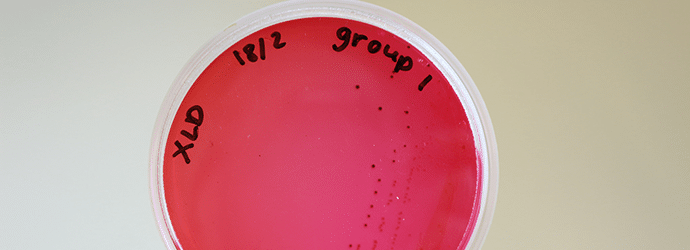If you are a plant biologist and working with the model plant Arabidopsis thaliana, undoubtedly you are a great fan of The Arabidopsis Information Resource (TAIR). You also probably order seeds/materials from the Arabidopsis Biological Resource Center (ABRC), or request them from fellow scientists. Of course, seeds are one of the basic materials you need to start your studies with.
However, if you want to study the function of a particular gene, you need to find the corresponding mutant, which is fairly easy using TAIR. Mutants are usually generated with either EMS or via T-DNA insertion. ABRC provides homozygous seeds of both types of mutants. It is good practice to confirm your mutant though, which is easy for T-DNA insertion mutants, using a quick genotyping method discussed below.

Figure: (A) Overview of T-DNA insertion and position of primers (B) Expected PCR results from genotyping.
Step One – Flanking PCR Primers
The first step of genotyping is to design your primers. You can design T-DNA primers using the SALK T-DNA Primer Tool. In the figure above, the T-DNA lies in a particular position of genomic DNA. The chosen primer pairs span this insertion site. Furthermore, the primer pair needs to cover a region long enough that the PCR reaction will not be able to amplify the insertion mutant. While, this occurs in part because T-DNA is huge in size, you also do not allow enough extension time for making the longer amplified fragment. The diagram shows the primer pair with an LP (left primer) and RP (right primer). In contrast, for wild-type seedlings, the primers give the desired amplification product from genomic DNA.
Enjoying this article? Get hard-won lab wisdom like this delivered to your inbox 3x a week.

Join over 65,000 fellow researchers saving time, reducing stress, and seeing their experiments succeed. Unsubscribe anytime.
Next issue goes out tomorrow; don’t miss it.
Step Two -Border PCR Primers
With the first primer pair you will not be able to distinguish a wildtype sample from a heterozygous one. To solve this problem, you need one more primer from the T-DNA region. This T-DNA primer is known as a border primer of T-DNA, or sometimes the left border primer of T-DNA. Using three primers at a time (gene specific LP, RP, and a T-DNA border primer), clearly distinguishes homozygous, heterozygous, and wild type plants. In particular, wild type plants give a single band. Homozygous mutant plants give a single band of a different size from wild type. And finally, heterozygous plants give both bands – one exactly like wild type, and the another the same as homozygous.
Troubleshooting
Sometimes it may happen that any of the primers you use may not work or not be compatible. In that case, you may be puzzled by your genotyping results. It’s better to start with the LP (left primer) and the RP (right primer). Once this pair is working, then try using three primers together. This makes it easier to figure out which, if any, of the primers is causing trouble during genotyping.
You made it to the end—nice work! If you’re the kind of scientist who likes figuring things out without wasting half a day on trial and error, you’ll love our newsletter. Get 3 quick reads a week, packed with hard-won lab wisdom. Join FREE here.








